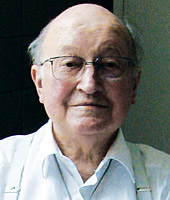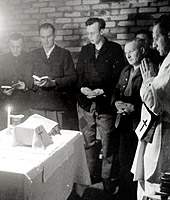Wartime Blessings
Two German WWII veterans
remember British POW camp
with gratitude
By Hope McPherson [hmcpherson@spu.edu]
Photo by Fox Photos/Hulton Archive/Getty Images

Hans Vossloh
|
One morning this past October, Beate Peter, wife of Seattle Pacific University Professor of Chemistry
Lyle Peter, dialed Werdohl, Germany. “I called my dad from the car to wish him a happy 89th birthday,” she says. “I told him we were on our way to hear the German theologian Jürgen Moltmann speak at SPU. That’s when he said, ‘I know him!’”
Beate Peter learned then that her father, Hans Vossloh, was a prisoner of war with Moltmann during World War II.
Now a postdoctoral researcher at the University of Washington, Peter grew up in Werdohl knowing that her father (like the fathers of many of her friends) had been a POW. At age 18, Vossloh had joined the German army.
It was 1936, and, raised in the Plymouth Brethren Church, he was a dedicated Christian.
On September 8, 1944, Vossloh, now an oberleutnant (the equivalent of a U.S. Army first lieutenant), led 30 men on a nighttime patrol in Belgium. Inadvertently, they crossed into Allied territory and came under heavy fire. Vossloh was shot, and he and his men were captured by French soldiers.
That same year, 18-year-old Jürgen Moltmann was assigned to the heavy weapons company of a German infantry battalion. Born into a secular family of educators in Hamburg, he had never felt the need for God. But in July 1943, that had begun to change.
Moltmann was conscripted as an air force “auxiliary” not
long before the British Royal Air Force unleashed “Operation Gomorrah” — air raids later called the “Hiroshima of Germany” — on Hamburg. During one of the fierce nightly bombing runs,
Moltmann was on a platform with other auxiliary youths, including a good friend. A bomb ripped apart the platform, instantly
killing Moltmann’s friend. That night, for the first time in his life,
Moltmann cried out, “My God, where are you?”
In 1944, he was sent into active duty. Within six months, while in a German forest near the front lines and separated from his unit, he surrendered to a British soldier.
Life as POWS

German prisoners celebrate midnight mass at an English POW camp in April 1946. Many former POWs from Norton Camp returned to thank their captors, says Moltmann.
|
Now depressed and without hope, Moltmann had little to do in his first POW camp in Belgium. He was next moved to a labor camp in Kilmarnock, Scotland. While there, after receiving a small Bible from a U.S. Army chaplain, he began reading — finally finding Psalm 39.
“I found words to express my feelings of isolation and forsakenness in these psalms of lamentation,” he says. “Then I went to the Gospel of Mark, and when I came to the death cry of Jesus, ‘My God, my God, why have thou forsaken me?’ I found in Jesus somebody who understood me. And from that time, I’m a Christian.”
After healing from his gunshot wound, Hans Vossloh was moved to Crewe Hall, a POW camp that housed 2,000 German officers in Cheshire County, England. Unlike the POW camps in Russia, which were often brutal, the POW camps in Great Britain focused on “re-educating” prisoners, says Peter. In Crewe Hall, she adds, her father took classes in Latin and math, even finishing the equivalent of a German university entrance exam. In 1947, Vossloh was moved to Norton Camp in Nottinghamshire — where Moltmann had been taken in 1946.
Although run with the help of the YMCA, Norton Camp was still a POW camp. There were guards, and there were guns. Yet prisoners could choose from two academic tracks: education or theology. “My dad worked in the office,” says Peter. “He had a secretarial job, although he did take New Testament Greek at one point.” Vossloh, who doesn’t speak English, has also told his daughter about the camp’s commander. “They had a very cordial understanding,” she says.
Moltmann’s memories of Norton Camp are similar: “That’s where I learned Hebrew and Greek, and had to pass another examination for school. We had plenty of time to listen and read; and we had a large, wonderful library. It was a wonderful time.”
The men were finally released in 1948, both changed forever. “A lot of us came to the Christian faith in the prison camps,” says Moltmann. “Overall,” states Peter, “my dad says the event had a very positive effect on his life.”
In the 1980s, many former German POWs, including
Moltmann and Vossloh, returned to Norton Camp. As all the men reminisced, Vossloh discovered several had become pastors. Remembers Moltmann, “We met again with the commander of the camp, Major Boughton. He said, ‘I never heard of prisoners of war who returned to the place of their imprisonment to say thank you for the experience.’ But that’s just what we did.”
Return to top
Back to Features Home
|